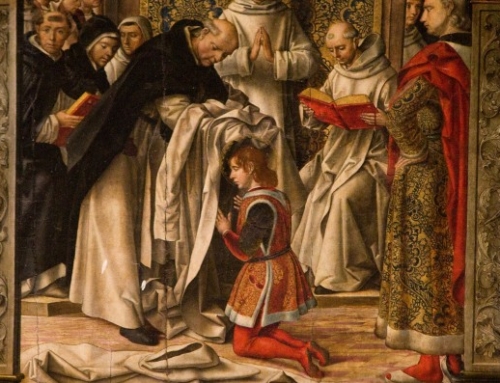This is the last of a four-part series on St. Thomas and Catholic Social Teaching.
To the ears of most readers of St. Thomas, the language of rights and human dignity will sound uncomfortably modern. However, these concepts do not have to be completely removed from St. Thomas’ rich understanding of the human person. It would be quite wrong to assert that Thomas Aquinas did not have any concept of the dignity of the human person. In fact, human dignity, in a sense, has quite a privileged place in his moral and ethical thought. Nevertheless, rather than attempting to resolve the distinctions between Thomism and modern political thought, let me first explore the role human dignity plays in the affairs of today, and then see how St. Thomas may help us appreciate the role of human dignity in Catholic social teaching.
As a starting point, let’s take the preamble to the Declaration of Independence of the United States of America. The Founding Fathers assert the existence of certain self-evident truths, namely, that all human persons are created equal and by their nature have claim to “certain, inalienable rights.” In discussing this preamble, most people tend to focus on the founders’ assertion of fundamental rights and, yet, miss the allusion to the even more fundamental quality of the human person from which these rights flow: human dignity.
Everyone is created with the same dignity; hence, everyone is created with an equal worth and can expect treatment from others reflecting their inherent worth. Thus, human rights flow from human dignity. Furthermore, these rights are inalienable because human dignity is inalienable. We may speak of a loss of dignity, whether it pertains to someone with particularly loose morals or to somebody who has been cruelly objectified. But in these situations, it is not so much that people have lost their dignity, but that they have lost their sense of dignity. In such cases, dignity does not need to be restored, but rediscovered.
A few weeks ago, a young woman took her own life because she had been diagnosed with a terminal illness but wanted to die “with dignity” by dying on her own terms. Obviously, lots of things went wrong in that decision-making process, but the most troubling aspect was the mistaken belief that her preemptive actions would somehow preserve her dignity, when in fact they ultimately destroyed it. Her dignity and worth as a human person did not lie in her health or her beauty or even her usefulness to society. Her dignity was not something that could be diminished because she suffered a pain that she could not bear. Her dignity was something deeper than all that. Her dignity consisted in being alive, in being loved, in knowing and loving – in other words, in being. Though due to fear and sorrow she may not have been aware of it, she was known and loved and would continue to be loved, even in her darkest night of pain and death.
This struggle to find and experience our dignity is not reserved for those who suffer or appear to be lost in contemporary society. To some extent, every person searches for the fulfillment of his dignity and, ultimately, his being. The fulfillment that we seek can only be imperfectly satisfied on this earth, whether it is through enjoyment of material goods or interpersonal communion. No matter how hard we try, there will remain a nagging feeling of non-fulfillment that can only be satisfied by one thing, namely the source of our dignity, the Creator who has endowed us with certain inalienable rights.
At the very heart of Catholic social teaching is the strong and vital affirmation of human dignity and its fulfillment in God: “Discovering that they are loved by God, people come to understand their own transcendent dignity, they learn not to be satisfied with only themselves but to encounter their neighbor in a network of relationships that are ever more authentically human” (Compendium of the Social Doctrine of the Church, no. 4). Not even doing good deeds offers true and total fulfillment for any individual. In fact, it is the other way around: fulfillment in God’s love for them inspires people to interact in a way that is truly fulfilling and truly human.
Hopefully, the championing of human dignity should now seem a little less alien for readers of St. Thomas. In the prologue to the Second Part of the Summa Theologiae, St. Thomas cites the imago dei—the image of God—as the fundamental principle for considering the morality of human actions. This image implies that every person is endowed with the powers of intellect, choice, and self-movement. Moreover, this movement is directed to a goal, that goal being none other than man’s ultimate fulfillment: union with God.
The dignity of the human person lies in man’s capacity for union with God, which, as St. Thomas teaches, is a union of love. It is this union that fulfills the dignity of man, not the bestowal of rights or services that may seem to cause pleasure or relief from pain. As St. Thomas repeatedly affirms throughout his writings on man, “Naught can quiet man’s will, save the universal good” (ST I-II, 2, 8). Since all created goods are finite, they simply are not able to satisfy man’s yearning for fulfillment. Only God, who is the source of all goodness, satisfies the yearning that is at the heart of every human being.
While we can and should help people begin to recognize their dignity and begin to satisfy their yearning for fulfillment, regardless of their relationship with God, it is important to ever keep in mind that true fulfillment is not something we can find on this earth. We can begin to sense it, though it be through a glass darkly colored. We can trust it, though it be veiled from our eyes. We can take comfort in it, though we struggle to find it…because God is faithful.
✠



